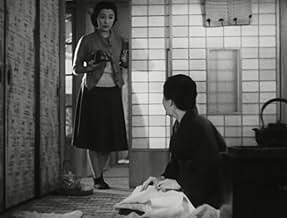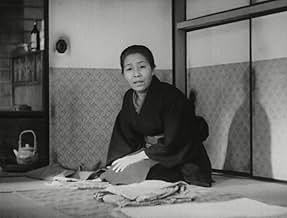Toda-ke no kyôdai
- 1941
- 1 घं 45 मि
IMDb रेटिंग
7.2/10
1.5 हज़ार
आपकी रेटिंग
अपनी भाषा में प्लॉट जोड़ेंWhen the patriarch of the Toda family suddenly dies, his widow discovers that he has left her with nothing but debt and married children who are unwilling to support her--except for her most... सभी पढ़ेंWhen the patriarch of the Toda family suddenly dies, his widow discovers that he has left her with nothing but debt and married children who are unwilling to support her--except for her most thoughtful son, just returned from China.When the patriarch of the Toda family suddenly dies, his widow discovers that he has left her with nothing but debt and married children who are unwilling to support her--except for her most thoughtful son, just returned from China.
- पुरस्कार
- कुल 1 जीत
फ़ीचर्ड समीक्षाएं
Ozu enters William Wyler terrain with a somber upscale family drama about a mother and daughter who are shuttled in unwelcome fashion from one family member's home to another following the death of the family patriarch. The thematic elements of displacement within a family unit anticipate TOKYO STORY -- there's even a bedtime scene between the mother and daughter that echoes one in the later film. There's a startling lack of music in this film, esp. during Ozu's normally music-filled transitional shots, that contribute to an overall sense of tense unease that touches on what might have been the general wartime state of mind among Japanese at that time. The war makes a subtle appearance in the form of the youngest son who offers to take the unwanted family members with him to settle in China -- a moment which might be aligned with Imperialist propaganda, though in a fascinating way: the Chinese "frontier" seems presented as a place where Japanese society can escape its social hypocrisies and begin anew.
This Yasujirô Ozu film came out just before Japan went to war with the United States. In many ways, it's very typical of any Ozu film. It uses the stationary camera set low to the ground (so the viewer is looking upward at the characters in many scenes, it has a simple plot about families and is centered on normal middle-class Japanese life. This is not a complaint but there is a sameness to Ozu's films that no other director quite achieved.
When the film begins, an extended family is having a day out. When it's over, the family patriarch is happy--telling his wife how it was a perfect day and how wonderful it was to see his kids and grandkids. Only moments later, the man slumps over and soon dies. Now the family is called back for the funeral and everyone must decide what to do with their mother now that father has died. Sadly, through the course of the film you realize that the kids are all very wrapped up in their own lives and no room in their hearts for their mother.
Other than the print being slightly degraded here and there, this DVD from the Criterion Collection is in pretty good shape. As for the story, I think how much you enjoy it will have a lot to do with how many Ozu films you've seen and how patient you are. The film is slow-moving (like many of his film) and the sameness of his films left me a bit bored after a while. Understand, I have probably seen at least 40 of his films. Worth seeing but certainly not among the director's best or most memorable.
When the film begins, an extended family is having a day out. When it's over, the family patriarch is happy--telling his wife how it was a perfect day and how wonderful it was to see his kids and grandkids. Only moments later, the man slumps over and soon dies. Now the family is called back for the funeral and everyone must decide what to do with their mother now that father has died. Sadly, through the course of the film you realize that the kids are all very wrapped up in their own lives and no room in their hearts for their mother.
Other than the print being slightly degraded here and there, this DVD from the Criterion Collection is in pretty good shape. As for the story, I think how much you enjoy it will have a lot to do with how many Ozu films you've seen and how patient you are. The film is slow-moving (like many of his film) and the sameness of his films left me a bit bored after a while. Understand, I have probably seen at least 40 of his films. Worth seeing but certainly not among the director's best or most memorable.
...and director Yasujiro Ozu. When the patriarch of a wealthy and respected family dies suddenly, his children are shocked to learn that he was secretly deeply in debt. They are forced to sell off his property and belongings to pay off this debt, which unfortunately leaves their mother (Ayako Katsuragi) and youngest, unmarried sister Setsuko (Mieko Takamine) without a place to live. The various brothers and sisters take them in, but personality clashes and selfish behavior finds the two women shuffled from one place to the next.
Ozu's strict, regimented filming technique is in full effect here, with cameras set low and at a distance, rarely moving within a scene, and very little music used to score. The performances are all low key, and much of the dialogue is seemingly banal banter. But there is a lot of roiling emotion suppressed in these characters, and it boils up on occasion to moving effect, although never in a loud or hysterical way, as in a more westernized movie. Shin Saburi is a stand-out as the black sheep brother who lives far away but brings harsh truths to the forefront during his infrequent visits. One aspect of the story that is sad in hindsight is when a character rhapsodizes about what a prosperous future they will have working in China, as this was made during the Japanese occupation. That didn't work out so well for the Japanese, or the Chinese for that matter. Recommended.
Ozu's strict, regimented filming technique is in full effect here, with cameras set low and at a distance, rarely moving within a scene, and very little music used to score. The performances are all low key, and much of the dialogue is seemingly banal banter. But there is a lot of roiling emotion suppressed in these characters, and it boils up on occasion to moving effect, although never in a loud or hysterical way, as in a more westernized movie. Shin Saburi is a stand-out as the black sheep brother who lives far away but brings harsh truths to the forefront during his infrequent visits. One aspect of the story that is sad in hindsight is when a character rhapsodizes about what a prosperous future they will have working in China, as this was made during the Japanese occupation. That didn't work out so well for the Japanese, or the Chinese for that matter. Recommended.
When a respected businessman dies unexpectedly, his affairs turn out to be in disorder, and his sons sell off most of his goods quickly. His widow, Ayako Katsuragi, and her youngest, unmarried daughter, Mieko Takamine, become houseguests of their siblings.... but they show little filial love. Will Shin Saburi, the wastrel son, inspired by his father's death to go off to China and work hard, turn out to be this Japanese version of KING LEAR's Cordelia?
Ozu hadn't completed a film in four years. When he came back to the studios to make this, his style had shifted and settled. Now, although he still hung his studies of familial relationships on sturdy plots, he had settled on what would become his postwar trademark of long, still shots from a low perspective. There's clearly a bit of wartime propaganda in the movie, telling Japanese civilians that there's endless opportunity in China to get ahead without worrying about getting into those awkward situations of losing face.
Ozu would make another movie the following year, then not another until 1947.... first problems with Japanese censors, and then clearing his name with the American Occupation forces. However, here we see the mature Ozu. He was excellent. He would only get better.
Ozu hadn't completed a film in four years. When he came back to the studios to make this, his style had shifted and settled. Now, although he still hung his studies of familial relationships on sturdy plots, he had settled on what would become his postwar trademark of long, still shots from a low perspective. There's clearly a bit of wartime propaganda in the movie, telling Japanese civilians that there's endless opportunity in China to get ahead without worrying about getting into those awkward situations of losing face.
Ozu would make another movie the following year, then not another until 1947.... first problems with Japanese censors, and then clearing his name with the American Occupation forces. However, here we see the mature Ozu. He was excellent. He would only get better.
In this 1941 classic, we've seen the ever-existing traditional Japanese male chauvinism. All the men in this film never had to do anything, all the chores were done by the females, no matter they were grandmother, mother or daughter. The men just acted like spoiled kids, asking the women around them to fetch everything they needed. The women had to take back all the heavy chairs after a photo shooting. Men asked his wife to fetch his pants, husband asked his wife to bring a glass of water, make a phone call. All the men were like studs who only took the responsibilities to give sperms to their wives, making them pregnant, making them to be the fathers. They were bread makers. Once they were home after works, they just sat down and gave orders to the females at home to serve them. And the women also took for granted like maids, following all the orders given by their men. We've seen all the Japanese films from black and white since 1020 up to date in 2022, the 21st Century. We saw old Kiki Kirin doing all the chores at home while her son or daughter just sat around, didn't even bother to help her a little bit in all of her later films. I've never seen any male character in any Japanese film helping the females. The male chauvinism is just so astoundingly disgusting in every Japanese film.
क्या आपको पता है
- ट्रिवियाThere has been speculation that Ozu's direction of this film related to his own family's situation where his sister-in-law (married to his older brother) and mother did not get along.
- कनेक्शनReferenced in Bandoui bom (1941)
टॉप पसंद
रेटिंग देने के लिए साइन-इन करें और वैयक्तिकृत सुझावों के लिए वॉचलिस्ट करें
- How long is The Brothers and Sisters of the Toda Family?Alexa द्वारा संचालित
विवरण
- रिलीज़ की तारीख़
- कंट्री ऑफ़ ओरिजिन
- भाषा
- इस रूप में भी जाना जाता है
- The Brothers and Sisters of the Toda Family
- फ़िल्माने की जगहें
- उत्पादन कंपनी
- IMDbPro पर और कंपनी क्रेडिट देखें
- चलने की अवधि1 घंटा 45 मिनट
- रंग
- ध्वनि मिश्रण
- पक्ष अनुपात
- 1.37 : 1
इस पेज में योगदान दें
किसी बदलाव का सुझाव दें या अनुपलब्ध कॉन्टेंट जोड़ें






























